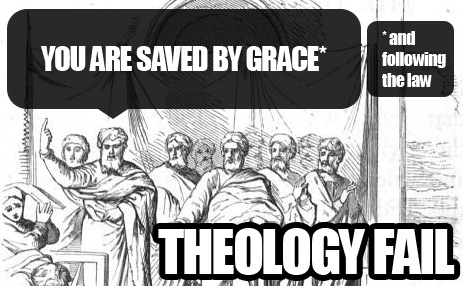 Previously we looked at what Calvinist’s believe regarding Total Inability. Here is what I believe.
Previously we looked at what Calvinist’s believe regarding Total Inability. Here is what I believe.
I am in basic agreement with Calvinists that there is no good work by which a person may earn or merit eternal life from God. Though there is much good that unregenerate people do, none of it is meritorious before God. He recognizes their good work and can even praise them for it, but these works in no way help them earn eternal life.
Humans do not contribute the tiniest bit to the free gift of eternal life. The free gift of eternal life is given completely by God’s grace.
If eternal life is by grace alone, then there is nothing—absolutely nothing!—we can do to earn, keep, or prove God’s free gift of eternal life.
Eternal life is by grace alone, through faith alone, in Jesus Christ alone.
We are not able to save ourselves or reform ourselves or do anything to produce or secure eternal life for ourselves.
We are able to believe
But our complete inability to contribute to our eternal life is quite different from our inability to receive the free gift of eternal life by faith. Believing in Jesus for eternal life is the polar opposite of trying to gain, keep, or prove eternal life by our own good works. As such, there is no boasting in faith or merit to faith.
If someone freely offered $1 million to a homeless person—or even to another millionaire—it would be ludicrous to say that the recipient of that gift somehow earned the $1 million because they received it with gratitude and joy. Imagine if there was a reword ceremony for this generous gift, and as the giver wrote out the check for $1 million, the receiver said, “I deserve this $1 million because when it was offered to me, I said yes. I earned this money!” The idea is preposterous.
There is no merit or effort of any sort involved in receiving a free gift.
It is not meritorious to receive a free gift
Some might say that there is merit or effort involved in understanding that a free gift is being offered. In the case of the offer of eternal life, some argue that unbelievers are unable to even understand their condition of being unregenerate sinners, or understand their need of eternal life as a free gift from God, and so while the reception of the free gift of eternal life by faith might not be meritorious, the “work” of understanding the need for that free gift is meritorious.
Returning once again to the analogy of the free gift of the $1 million, the Calvinist would say that when the person is offered the $1 million, they either cannot even understand what is being offered, or they deny that they even need it.

In terms of eternal life, before a person can believe in Jesus, they first need to understand that there is a God, that God is righteous, that we are unrighteous, and that God offers His righteousness to those who will believe in Jesus for it. Many people must also understand that Jesus is God incarnate, lived a sinless life, died on the cross, and rose again from the dead. It is these sorts of truths that a Calvinist says an unregenerate person is unable to understand and believe on their own.
And I would agree.But thankfully, God has not left us on our own.
We cannot take the first step
He has sent Jesus Christ, who is the Way, the Truth, and the Life (John 14:6).
He has sent the Holy Spirit to convict the world of sin, righteousness, and judgment (John 16:8). He has given us Scripture, by which we can learn more about God’s ways in history and the revelation of Himself in Jesus Christ. He has given us other believers, who may share the truth of the Gospel with us. He has given us creation, which is a visual testimony of His character and power. He has given us a conscience, wisdom, reason, feelings, and desires, all of which may lead us to the truth. God may even use angels, visions, and dreams to impress upon someone the necessity and importance of believing in Jesus for eternal life.
Based on what the Scripture teaches, it seems that all of the things God has given to humanity are sufficient to persuade and convince a person to believe in Jesus for eternal life. While I may disagree that regeneration precedes faith, I wholeheartedly defend the truth that revelation precedes faith.
People are able to believe because God has revealed Himself to humanity in numerous ways. Faith comes by hearing, and hearing by the Word of God (Rom 10:17). And the Word of God comes, not just through the pages of Scripture, but through the self-revelation of God in all its forms.
God enables people to believe because He has reveals Himself to them. The following discussions of free will, sin, faith, and regeneration will explain this in more detail.
What are your thoughts about total inability? Are people able to believe in Jesus for eternal life? Or must God first regenerate people so that they can believe?
If you want to read more about Calvinism, check out other posts in this blog series: Words of Calvinism and the Word of God.




 The first thing to note about 1 John 5:19 is that the words “control” or “sway” are not found in the Greek at all. These words are added by the translators in an attempt to make sense of what John writes. The addition of these words is due in large part to a second translation issue in this verse.
The first thing to note about 1 John 5:19 is that the words “control” or “sway” are not found in the Greek at all. These words are added by the translators in an attempt to make sense of what John writes. The addition of these words is due in large part to a second translation issue in this verse. Usually the translator will try to add words that fit best with the overall context of the passage and book, but more often than not, the translator will add words that also fits with their own preconceived theology. This is why the NIV,
Usually the translator will try to add words that fit best with the overall context of the passage and book, but more often than not, the translator will add words that also fits with their own preconceived theology. This is why the NIV, 
 Titus 1:15 is sometimes referenced as further proof for the doctrine of Total Depravity and its twin, total inability. The text says this:
Titus 1:15 is sometimes referenced as further proof for the doctrine of Total Depravity and its twin, total inability. The text says this:
 Yet Paul quotes it, and then “approves” of it by saying “This testimony is true” (Titus 1:13), not because he thinks it is right, but because the person who said it is a Cretan himself, and Paul wants to use this false teacher’s own words against him to show how foolish this teaching really was.
Yet Paul quotes it, and then “approves” of it by saying “This testimony is true” (Titus 1:13), not because he thinks it is right, but because the person who said it is a Cretan himself, and Paul wants to use this false teacher’s own words against him to show how foolish this teaching really was.

 Secondly, however, and more to the point about Total Depravity, it appears that even these Gentiles who walk in the futility of their mind do so because they have chosen to do so. In Ephesians 4:17-18, Paul strings together several perfect participles, which means that they are dependent upon the time of the main verb in his statement. The main verb is the past-tense (aorist) found in Ephesians 4:19 where Paul says that “they have given themselves over.” In other words, this means that the reason these Gentiles are futile in their minds, have their understanding darkened, have blindness of their heart, and are past feeling, is because they gave themselves over to lewdness, uncleanness, and greediness.
Secondly, however, and more to the point about Total Depravity, it appears that even these Gentiles who walk in the futility of their mind do so because they have chosen to do so. In Ephesians 4:17-18, Paul strings together several perfect participles, which means that they are dependent upon the time of the main verb in his statement. The main verb is the past-tense (aorist) found in Ephesians 4:19 where Paul says that “they have given themselves over.” In other words, this means that the reason these Gentiles are futile in their minds, have their understanding darkened, have blindness of their heart, and are past feeling, is because they gave themselves over to lewdness, uncleanness, and greediness.
 Though many Calvinists use Ephesians 2:5 and Ephesians 2:8-9 to teach that “regeneration precedes faith” and “faith is a gift of God,” a careful examination of these texts reveals that they teach the opposite.
Though many Calvinists use Ephesians 2:5 and Ephesians 2:8-9 to teach that “regeneration precedes faith” and “faith is a gift of God,” a careful examination of these texts reveals that they teach the opposite. If faith were a work—even if it was a work of God—Paul’s point would be reduced to gibberish for he would be saying that salvation is not by works but it is by the work of faith. When we allow the clear contrast between faith and works to stand, Paul’s points is clearly seen.
If faith were a work—even if it was a work of God—Paul’s point would be reduced to gibberish for he would be saying that salvation is not by works but it is by the work of faith. When we allow the clear contrast between faith and works to stand, Paul’s points is clearly seen. In Greek, pronouns must agree with their antecedent in gender and number. English somewhat does this with pronouns like “he” and “she” but other pronouns like “they” and “it” are more difficult to determine. No so in Greek. All pronouns in Greek have gender and number, and they must always agree in gender and number to the noun they are pointing to, whether it is masculine, feminine, or neuter.
In Greek, pronouns must agree with their antecedent in gender and number. English somewhat does this with pronouns like “he” and “she” but other pronouns like “they” and “it” are more difficult to determine. No so in Greek. All pronouns in Greek have gender and number, and they must always agree in gender and number to the noun they are pointing to, whether it is masculine, feminine, or neuter. Nevertheless, it seems best to adopt the fifth and final view, for it not only places emphasis on the conceptual phrase which Paul has stated twice, but it also takes notice of the chiastic structure which Paul uses to further explain the gift of God.
Nevertheless, it seems best to adopt the fifth and final view, for it not only places emphasis on the conceptual phrase which Paul has stated twice, but it also takes notice of the chiastic structure which Paul uses to further explain the gift of God.